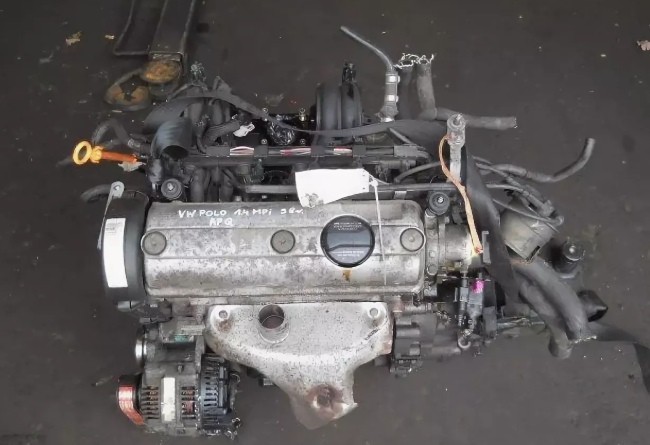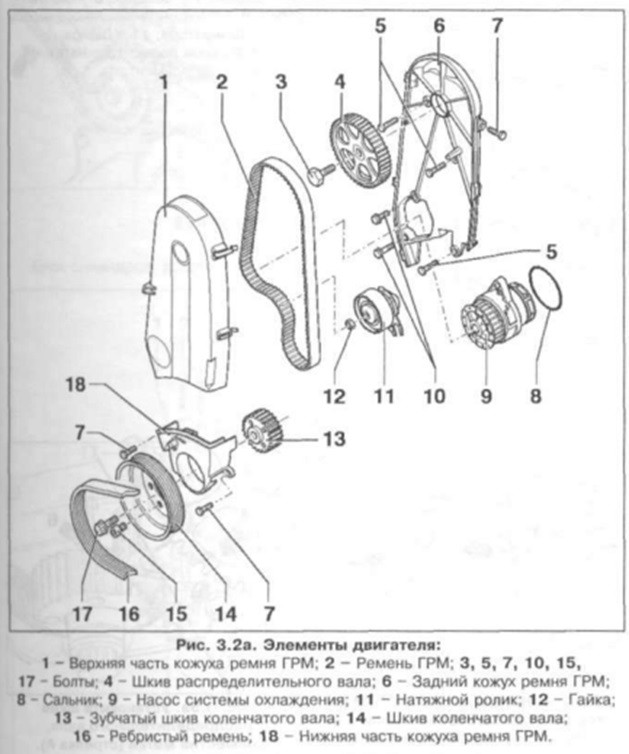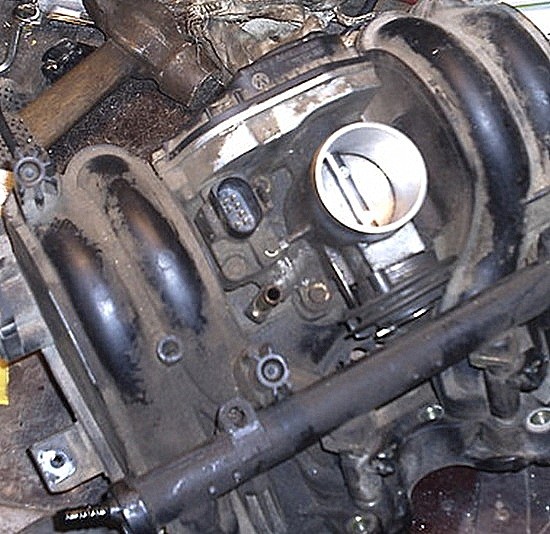
Volkswagen APQ engine
Content
The next development of the engine builders of the Volkswagen auto concern has replenished the line of EA111-1,4 engines, which includes AEX, AKQ, AXP, BBY, BCA, BUD and CGGB.
Description
The VW APQ engine is a modified version of the same type AEX engine. It should be noted right away that the differences in them are insignificant, mainly related to the mounting of the units.
Production has been organized at the concern's plant since 1996. The unit was produced until 1999.
APQ is a 1,4-liter in-line gasoline four-cylinder aspirated engine with a capacity of 60 hp. with and a torque of 116 Nm.

It was mainly intended for installation on Seat Ibiza II / 6K / (1996-1999) cars. Additionally, this engine can be found on the Volkswagen Golf III, Polo and Caddy II.
The block is traditionally cast from high-strength cast iron with an internal bore of cylinders (not sleeved). An innovative solution is an aluminum crankcase, which reduces the weight of the entire unit. In addition, the landing of the oil pan on the body of the block is carried out without a gasket. The seal is a layer of sealant.
Aluminum pistons. The skirt is covered with an anti-friction compound. Three rings. Two upper compression, lower oil scraper. Piston pins of floating type. Retaining rings keep them from axial displacement.
The crankshaft is fixed on five bearings.
Aluminum cylinder head. It houses a camshaft with 8 valves (SOHC), the thermal clearance of which is automatically adjusted by hydraulic lifters.
Timing belt drive. The frequency of replacing the belt is after 80-90 thousand kilometers. After replacement, it is recommended to check its condition every 30 thousand km.

An unpleasant feature of the timing is the bending of the valves when the drive belt breaks.
Combined type lubrication system. The oil pump and oil receiver are located in the oil pan, and the oil pump receives rotation due to the gear drive from the crankshaft through the intermediate shaft (until 1998 it had an individual chain drive).
The capacity of the lubrication system is 3,4 liters. Engine oil specification VW 500 00|VW 501 01|VW 502 00.
Injection / ignition system - Motronic MP 9.0 with self-diagnosis. ECU - 030 906 027K, original spark plugs VAG 101000036AA, NGK BURGET 101000036AA, 7LTCR, 14GH-7DTUR, NGK PZFR5D-11 analogues approved by the manufacturer.
In general, the APQ motor is structurally simple and reliable in operation, but according to car owners, it is not very convenient for maintenance.
Technical specifications
| Manufacturer | VAG car concern |
| Release year | 1996 |
| Volume, cm³ | 1390 |
| Power, hp from | 60 |
| Torque, Nm | 116 |
| Compression ratio | 10.2 |
| Cylinder block | cast iron |
| Number of cylinders | 4 |
| Cylinder head | aluminum |
| Fuel injection order | 1-3-4-2 |
| Cylinder diameter, mm | 76.5 |
| The piston stroke, mm | 75.6 |
| Timing drive | belt |
| Number of valves per cylinder | 2 |
| Turbocharging | no |
| Hydraulic compensators | Yes |
| Camshaft adjuster | no |
| Lubrication system capacity, l | 3.4 |
| Applied oil | 5W-30 |
| Fuel system | injector |
| Fuel | gasoline AI-92 |
| Environmental standards | Euro 2 |
| Resource, outside. km | 250 |
| Location | transverse |
| Tuning (potential), l. With | 120* |
*without loss of resource 70 l. With
Reliability, weaknesses, maintainability
Reliability
The service life and safety margin are the main characteristics of the engine reliability. The APQ has a claimed mileage of 250 thousand km, but in reality it is much higher. Car service workers met units that departed more than 380 thousand km.
Long-term operation of the motor is possible only in the case of its timely and high-quality maintenance. Car owners also confirm the reliability of the internal combustion engine. On one of the forums, a car enthusiast Limousine from Moscow writes: “... a normal engine and simple to disgrace. On the bottoms and under load it works without problems. On the top bullets be healthy.
In addition to a high resource, APQ has a good margin of safety. It can be easily boosted up to 120 hp. forces. But at the same time, it must be remembered that any tuning significantly reduces the life of the motor. Additionally, performance characteristics are reduced, for example, the degree of purification of exhaust gases. Based on the foregoing, one conclusion can be drawn: there is not enough power - it is better to replace it with another, stronger one.
Thus, the vast majority of motorists evaluate the engine as simple and reliable, but requiring attention in terms of maintenance.
Weak spots
Like all engines, the APQ is not without weaknesses. Many car owners note inconvenience during maintenance. This is due to the layout of the unit. Indeed, sometimes in order to get to the desired node, you have to dismantle a number of others.
Throttle node. It is noted that it is prone to pollution due to low-quality fuel. Consequences - unstable operation of the engine, especially noticeable at x / x speeds.

The second most common malfunction is the ignition coil. You can understand the need to replace the mechanism by the bluish halos around the high-voltage wires. The consequences of the malfunction are serious - fuel that does not burn completely leads to the destruction of the catalyst.
Low timing belt resource. Untimely replacement leads to a major overhaul of the engine (destruction of the cylinder head due to bending of the valves).
Often there is oil leakage through the valve cover seal.
All weaknesses can be minimized by timely maintenance of the motor and constant monitoring of its condition.
Maintainability
According to car owners, the maintainability of APQ is high. The cast-iron block of cylinders allows for a complete overhaul of the engine, and more than once.
There are also no problems with the selection of spare parts for restoring the efficiency of the motor. At the same time, you need to be prepared in advance for their high cost.
The simplicity of the device and the availability of spare parts make it possible to repair the unit in a garage.
Based on the significant material costs for the acquisition of the necessary components and parts for repair, it is advisable to consider the option of purchasing a contract engine. Often this way of solving the problem can be cheaper.
On specialized forums you can find the approximate amount of the cost of restoration work.
Thus, the cost of an engine overhaul is about 35,5 thousand rubles. At the same time, a contract ICE can be purchased for 20-60 thousand rubles, and when purchased without attachments, you can find it cheaper.
The Volkswagen APQ engine is simple, reliable and economical, subject to all the manufacturer's recommendations for its operation.

